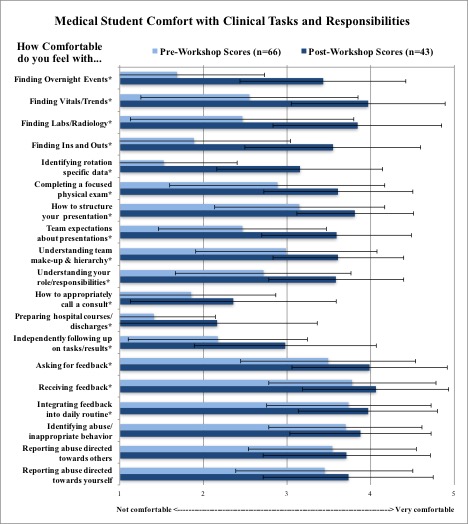Poster5-06: SUCCESSFUL INCORPORATION OF A RESIDENT DRIVEN TRANSITIONS WORKSHOP INTO UNDERGRADUATE MEDICAL EDUCATION
Rebecca F Brown, MD1, Mary Shen, MD2, Anthony G Charles, MD1; 1University of North Carolina, 2University of Michigan
Introduction The transition from pre-clinical years to full time clinical studies is a difficult and anxiety-inducing experience for medical students. A pilot resident driven two-hour workshop offered to pre-clinical medical students in 2016 demonstrated increased comfort and decreased anxiety associated with expected clinical tasks. Our aim was to determine if incorporation into mandatory curriculum provided a beneficial adjunct in preparing a broader group of students prior to starting clinical rotations.
Methods A prospective validated survey measuring comfort (1=least to 5=most comfortable) and anxiety (1=least to 5=most anxious) levels was administered to students prior to and following participation in the workshop after incorporation into transitions curriculum. Pre-workshop and post-workshop scores were averaged and compared using simple T-test.
Results The response rate for the pre-course survey was 93% (139/150) and 73% (109/150) for the post-course survey. Students reported a significant increase in compiled comfort scores with daily hospital tasks after workshop participation (67.0±11.9) when compared to all students prior to the workshop (51.4±12.1, p<0.0001), with statistically significant improvement in 16 of 19 areas of comfort (p<0.05 for all). Students also reported decreased compiled anxiety scores after workshop participation (31.1±7.92 pre-workshop vs. 27.7±8.18 post-workshop, p=0.001), with significant decrease in anxiety in 6 of 10 areas of potential anxiety included in the survey (p<0.03 for all). Data from the 2016 pilot course demonstrated similar results, withan increase in compiled comfort scores (61.7±10.89 vs. 71.6±7.81, p<0.0001) and an improvement in 15 of 19 comfort areas (p<0.0001 for all), as well as decreased overall anxiety (30.9±7.17 vs. 28.2±6.52, p=0.053), with significant decrease in anxiety in 2 of 10 areas (p=0.02, 0.008).
Conclusion Students reported increased comfort and decreased anxiety following participation in a resident driven workshop after incorporation into transitions coursework. These findings are similar to data collected in 2016 from a smaller, self-selected group of students after participation in a similar voluntary pilot course. These data suggest that incorporation of a resident driven workshop providing hands-on experience with pre-rounding exercises and interaction with residents prior to starting clinical rotations can allay anxiety and afford a potential benefit in a broader group of medical students.

